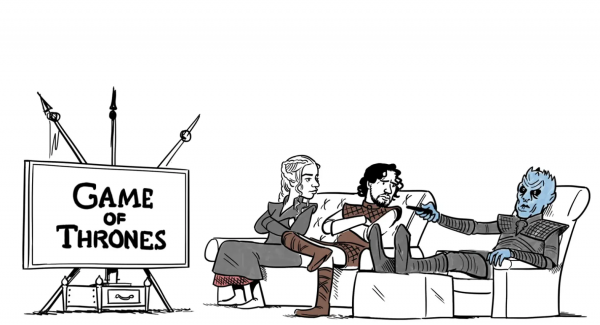
Illustration of Game of Thrones characters who are unimpressed while watching the show. By Silueta Production House via Vimeo.
Let’s face it: lots of fans despised the final season of Game of Thrones. Earlier this year, Scientific American suggested that’s because the storytelling style changed from sociological to psychological. When the storytelling was sociological, the characters evolved often in dramatic, unpredictable ways in response to the broader institutional settings, and the countervailing incentives and norms that surrounded them. When the style switched to psychological, viewers had to identify with the characters on a personal level and become invested in them for the story to work. Within this individualistic framing, characters’ unexpectedly evil actions and untimely deaths stopped making sense. As it happens, not only is sociological storytelling an important driver in keeping audiences devoted, it can also be a powerful tool in crafting a persuasive research article.
Research suggests that storytelling is powerful precisely because it gives human faces to abstract social forces, emplotting them as combatants over the very problems which social theory endeavors to understand — conflict, inequality, and modernization, to name but a few. Andrew Abbott thus argues for a lyrical sociology that recreates the experience of social discovery in the reader. Sara Lawrence-Lightfoot and Jessica Hoffmann Davis similarly suggest that to capture the complexity, dynamics, and subtlety of human experience and organizational life, one must document the voices and visions of the people they are studying.
- Andrew Abbott. 2007. “Against Narrative: A Preface to Lyrical Sociology.” Sociological Theory 25(1): 67-99.
- Sara Lawrence-Lightfoot and Jessica Hoffmann Davis. 1997. The Art and Science of Portraiture. Jossey-Bass Incorporated Pub.
Is it enough to fashion stories that enthrall readers with captivating narrative arcs, or must scholarship also advance theoretical arguments? In a recent Twitter thread, Jeff Guhin invites discussion of the tension in qualitative work between telling stories about social problems and making arguments. Some sociologists argue that description alone makes a valuable contribution. Scholars doing qualitative work should strive to publish descriptively rich, findings-driven papers that are so grounded and concrete that the reader intuitively grasps the “so what.” Though ethnography may share some characteristics with imaginative writing, Hammersley points out that it is more than that. Ethnographers must grapple with a number of issues as they analyze data and write up their work, just as they do when they choose where and how to collect it.
- Max Besbris and Shamus Khan. 2017. “Less Theory. More Description.” Sociological Theory 35(2): 147-153.
- Ashley Mears. 2017. “Puzzling in Sociology: On Doing and Undoing Theoretical Puzzles.” Sociological Theory 35(2): 138-146.
- Martyn Hammersley. 2006. “Ethnography: Problems and Prospects.” Ethnography and Education 1(1): 3-14.
Using our sociological imagination in storytelling doesn’t mean discounting characters’ personal or psychological motivations. Instead, it means showing characters in ongoing and complex interaction with the economic and political forces of broader society and illustrating the consequences that emerge. This can be a powerful tool for learning social theory.
- Dennis S. Erasga. 2010. “When Story Becomes Theory: Storytelling as Sociological Theorizing.” Asia-Pacific Social Science Review 10(1): 21-38.
